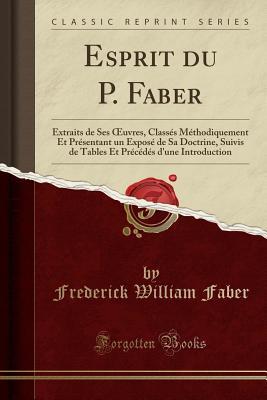- Bible
- Read the Bible
- Bible Versions
- Verse of the Day
- Reading Plans
- Verses by Topic
- Books of the Bible
- Bible Images
- Study
- Commentaries
- Concordances
- Dictionaries
- Encyclopedias
- Sermons
- Bible Atlas & Maps
- BP Wiki
- Devotionals
- Today's Devotionals
- Light of the World
- All Devotionals
- Inspirational Quotes
- More
- Picture Quotes
- Videos
- Inspirational
- Bible Study
- What The Bible Says
- Bible Q&As
- Daily Bread
- Bible by Genre
- Bible Stories
- Random Bible Verse
- Community
- Store
Esprit Du P. Faber: Extraits de Ses Oeuvres, Class�s M�thodiquement Et Pr�sentant Un Expos� de Sa Doctrine, Suivis de Tables Et Pr�c�d�s d'Une Introduction (Classic Reprint)
by Frederick W. Faber
Excerpt from Esprit du P. Faber: Extraits de Ses OEuvres, Class�s M�thodiquement Et Pr�sentant un Expos� de Sa Doctrine, Suivis de Tables Et Pr�c�d�s d'une Introduction
Ses premi�res ann�es purent faire pr�sager ce qu'il serait un jour. Au milieu de ses vivacit�s et de ses ar deurs, qui �taient charmantes, il fut ais� de deviner que le sens religieux serait la dominante de son �me. Chez lui, d'ailleurs, la religion n'�tait pas calme et reposante, mais agit�e et f�brile. Il faut tout dire l'�poque o� il vi vait n'�tait pas faite pour donner satisfaction � ses d�sirs enfiamm�s. C'�tait en 1820 - 1830. Le pi�tisme se d�ve10p pait au sein du clerg� anglican, fatigu� de consid�rer uniquement la foi comme une simple morale �. L'usage des honn�tes gens. Au naturalisme du si�cle pr�c�dent, beaucoup d'�mes souhaitaient de faire succ�der une sorte de mysticisme �vang�lique, plus conforme � l'esprit des saintes-lettres et aux traditions de l'antiquit�. Parmi les Pasteurs, les uns demeuraient soumis a l'ancienne �cole; les autres se rangeaient dans la nouvelle. C'�tait l'anar chic, et lame du jeune Faber allait souffrir �trangement de ces d�chirements de son �glise. Mais ils devaient un jour le conduire � l'�glise.
About the Publisher
Forgotten Books publishes hundreds of thousands of rare and classic books. Find more at www.forgottenbooks.comwww.forgottenbooks.com
This book is a reproduction of an important historical work. Forgotten Books uses state-of-the-art technology to digitally reconstruct the work, preserving the original format whilst repairing imperfections present in the aged copy. In rare cases, an imperfection in the original, such as a blemish or missing page, may be replicated in our edition. We do, however, repair the vast majority of imperfections successfully; any imperfections that remain are intentionally left to preserve the state of such historical works.
Ses premi�res ann�es purent faire pr�sager ce qu'il serait un jour. Au milieu de ses vivacit�s et de ses ar deurs, qui �taient charmantes, il fut ais� de deviner que le sens religieux serait la dominante de son �me. Chez lui, d'ailleurs, la religion n'�tait pas calme et reposante, mais agit�e et f�brile. Il faut tout dire l'�poque o� il vi vait n'�tait pas faite pour donner satisfaction � ses d�sirs enfiamm�s. C'�tait en 1820 - 1830. Le pi�tisme se d�ve10p pait au sein du clerg� anglican, fatigu� de consid�rer uniquement la foi comme une simple morale �. L'usage des honn�tes gens. Au naturalisme du si�cle pr�c�dent, beaucoup d'�mes souhaitaient de faire succ�der une sorte de mysticisme �vang�lique, plus conforme � l'esprit des saintes-lettres et aux traditions de l'antiquit�. Parmi les Pasteurs, les uns demeuraient soumis a l'ancienne �cole; les autres se rangeaient dans la nouvelle. C'�tait l'anar chic, et lame du jeune Faber allait souffrir �trangement de ces d�chirements de son �glise. Mais ils devaient un jour le conduire � l'�glise.
About the Publisher
Forgotten Books publishes hundreds of thousands of rare and classic books. Find more at www.forgottenbooks.comwww.forgottenbooks.com
This book is a reproduction of an important historical work. Forgotten Books uses state-of-the-art technology to digitally reconstruct the work, preserving the original format whilst repairing imperfections present in the aged copy. In rare cases, an imperfection in the original, such as a blemish or missing page, may be replicated in our edition. We do, however, repair the vast majority of imperfections successfully; any imperfections that remain are intentionally left to preserve the state of such historical works.
BUY NOW
Paperback, 528 pages
Published September 2nd 2018 by Forgotten Books
© 2025 Bibleportal.com All rights reserved.

Frederick William Faber, British hymn writer and theologian, was born at Calverley, Yorkshire, where his grandfather, Thomas Faber, was vicar.
In January 1837, he was elected fellow of National Scholars Foundation. Meanwhile, he had given up the Calvinistic views of his youth, and had become an enthusiastic follower of John Henry Newman.
He accepted the rectory of Elton in Huntingdonshire, but soon after went again to the continent, in order to study the methods of the Roman Catholic Church. After a prolonged mental struggle, he joined the Catholic Church in November 1845.
Faber published a number of prose works, and three volumes of hymns, among the most well known is Faith of Our Fathers.
... Show more